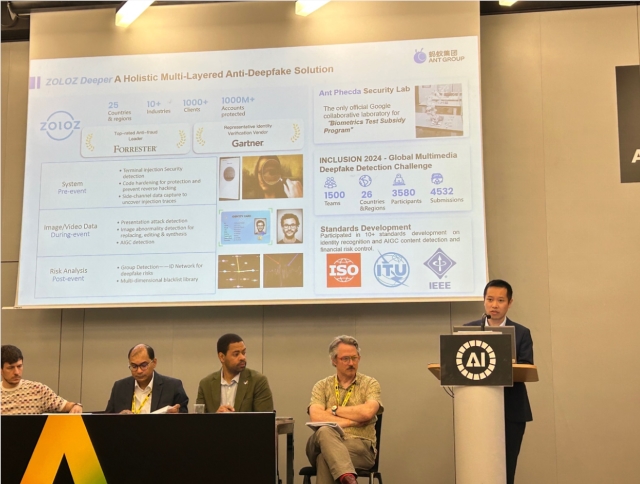Recently, the United Nations held the Global AI for Good (Artificial Intelligence for Good) Summit in Geneva, Switzerland. Peng Jin, Vice President of the Technology Strategy and Development Department of Ant Group, was invited to share China's technological achievements in combating "deepfakes" in financial scenarios. At the same time, it disclosed that the frequency of deepfake attacks on facial recognition at Southeast Asian banks served by Ant Digital has dropped from a peak of 10% to 4%, with the identification accuracy rate remaining at 99.9%. This can provide a replicable "Chinese solution" for global AI security governance.

Peng Jin, Vice President of the Technology Strategy and Development Department of Ant Group, shared China's technological achievements at the AI for Good Summit
The Global AI for Good Summit was co-hosted by the International Telecommunication Union (ITU), a UN agency, along with over 40 UN sister agencies, and jointly organized by the Swiss government. The summit aims to promote the use of artificial intelligence to advance health, climate, gender, inclusive prosperity, sustainable infrastructure, and other global development priorities.
With the widespread application of generative AI tools, malicious incidents involving "AI face swapping" have become frequent globally. Especially in financial institutions' user registration and transaction processes, identity forgery may lead banks and payment platforms to make incorrect judgments, causing direct economic losses. According to Peng Jin, in 2024, the deepfake attack rate in Southeast Asian banks reached 10% at its peak, meaning that 10 out of every 100 facial verification attempts were fake faces. With the technical support of Ant Digital's products, the deepfake attack rate for Southeast Asian banks it serves has been reduced to 4%. The interception rate for user identity authentication in these banks has dropped from 50% to 3%. While improving business efficiency, the identification accuracy rate remains at 99.9%. Peng Jin also mentioned that the algorithm for facial recognition attack defense is a process of confrontation with black market forces. Algorithms still need to be updated on a daily basis to combat and predict new forms of forgery.
According to the introduction, the mainstream methods of "face swapping fraud" currently faced by financial institutions include two categories. One is presentation attack, where false images are presented in front of the camera to bypass live detection. The other is injection attack, where the camera is hacked at the system level, and pre-recorded images/videos are injected to replace the facial images captured by the camera. ZOLOZ, a subsidiary of Ant Digital, provides financial-grade identity security authentication services. It implements environmental safety detection at the device end, uses dynamic deep learning models at the application end to accurately identify biometric features, and has established a complete business risk control strategy to effectively resist various attacks. Currently, ZOLOZ's relevant technology products have served over 25 countries and regions worldwide, helping overseas digitalization development.
Previously, Ant Digital opened more than 1.8 million multimodal deepfake datasets at the top AI conference IJCAI 2025, covering 88 types of forgery techniques, promoting industry research on verifiable and traceable AI security.
